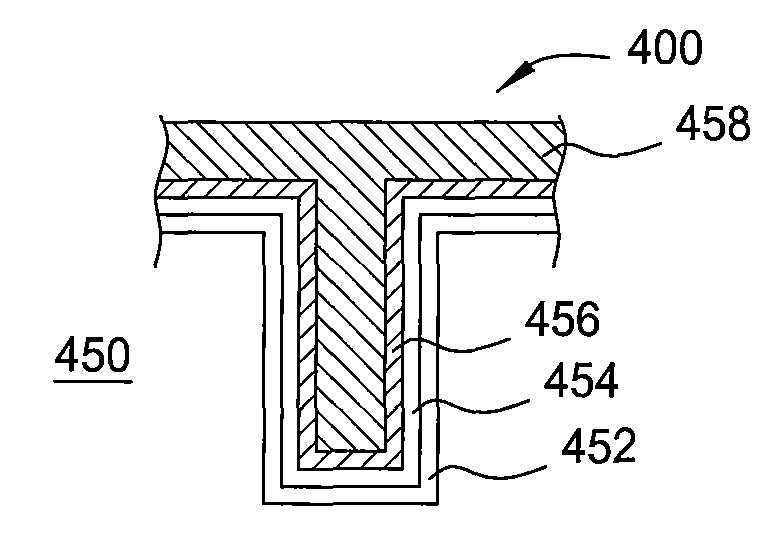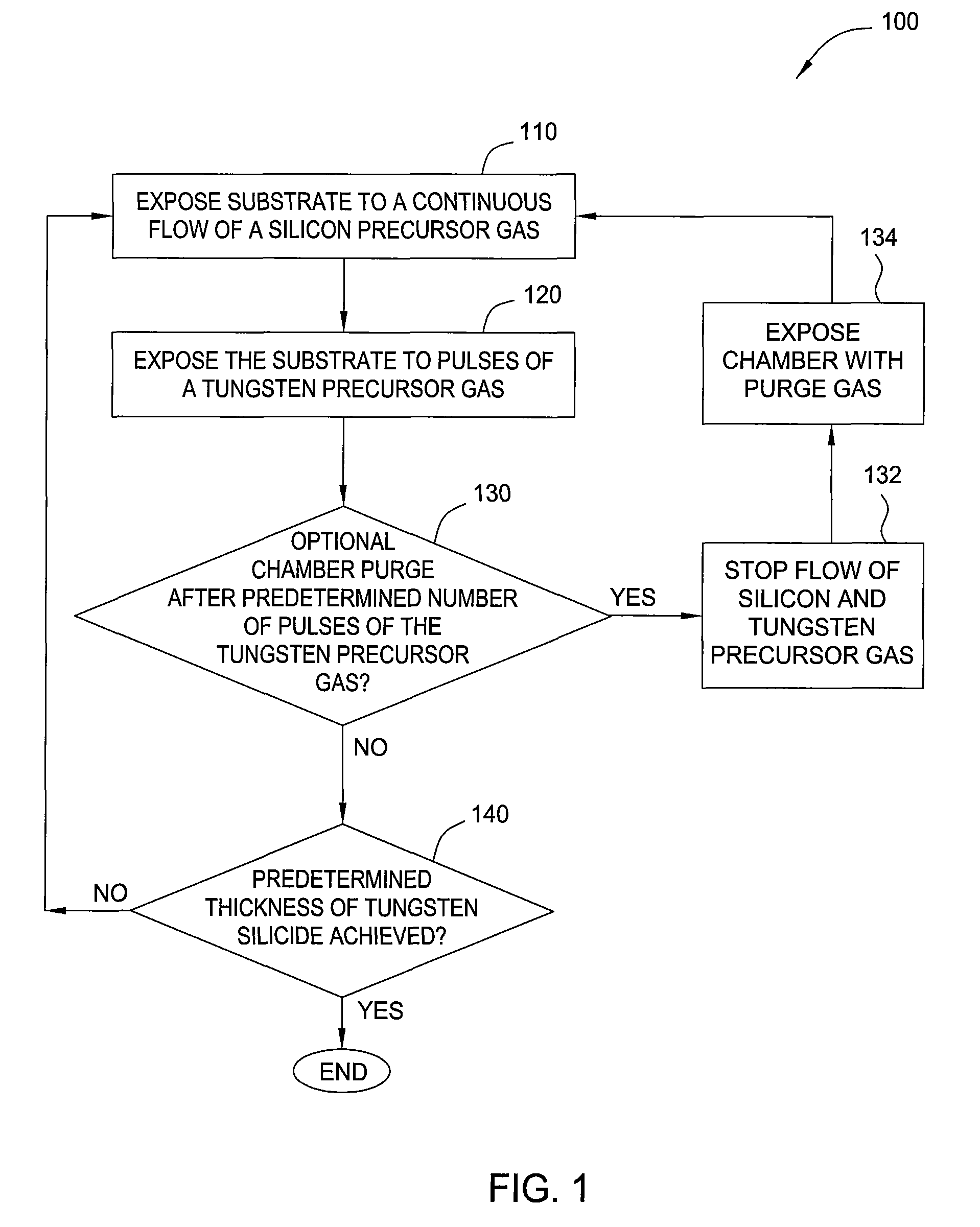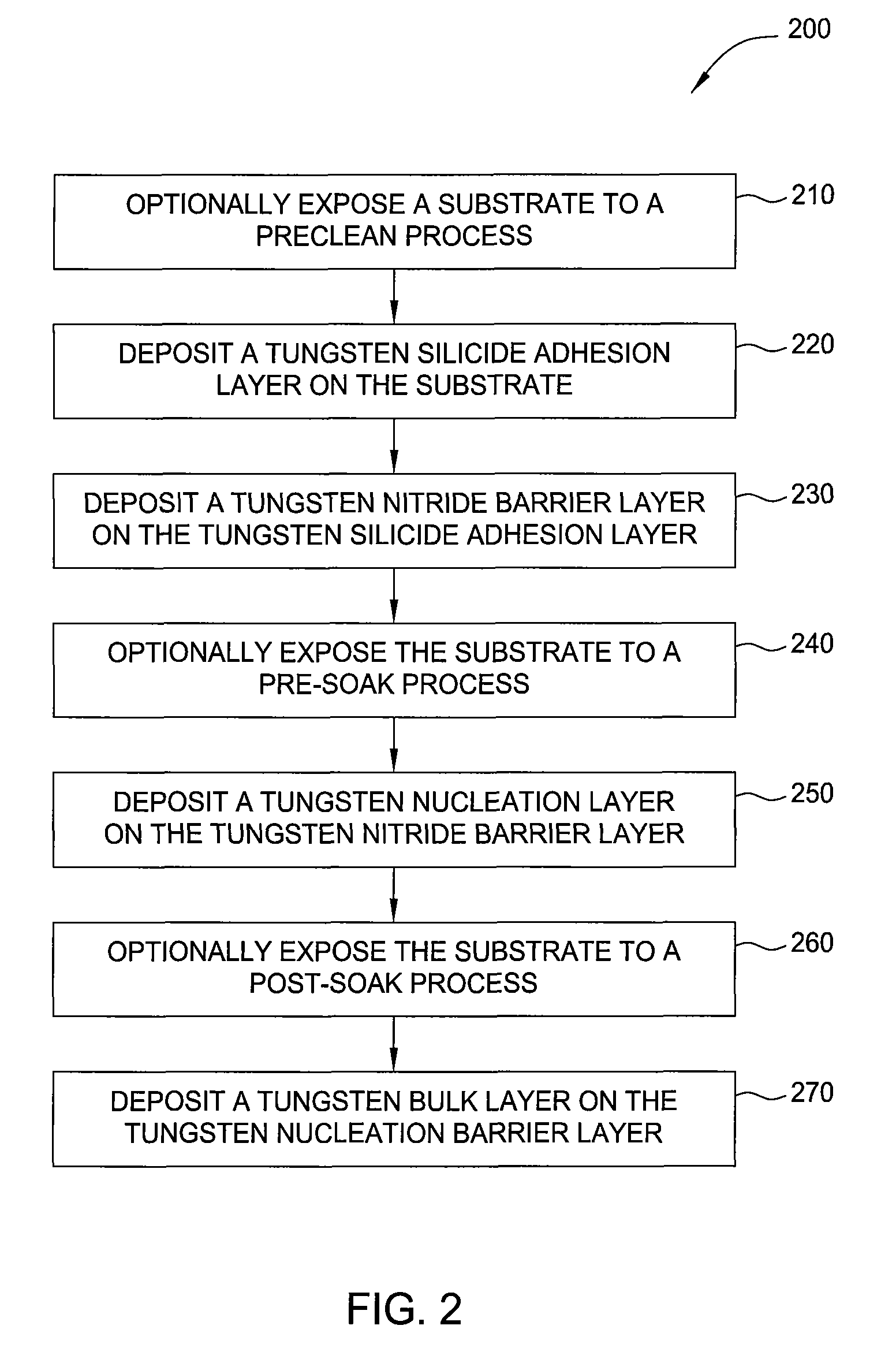Vapor deposition of tungsten materials
a technology of tungsten and vapor deposition, which is applied in the direction of chemical vapor deposition coating, coating, coating process, etc., can solve the problems of compromising the structural and operational integrity of the underlying portion of the integrated circuit formed, the need for more complexity in the chamber design and gas flow technique, and the difficulty of uniform tungsten vapor deposition, etc., to achieve the effect of improving conductivity and surface uniformity, and increasing the production level throughpu
- Summary
- Abstract
- Description
- Claims
- Application Information
AI Technical Summary
Problems solved by technology
Method used
Image
Examples
example 1
[0068]The substrate was placed into a deposition chamber and exposed to a vapor deposition process to form a tungsten silicide layer under the following conditions:
[0069]Reagent: SiH4 and WF6;
[0070]Pressure: about 5 Torr;
[0071]Temperature: about 380° C.;
[0072]Flow rates: about 120 sccm of SiH4, and about 60 sccm of WF6;
[0073]Pulse durations of WF6: about 0.5 seconds (on), about 0.5 seconds (off).
[0074]This vapor deposition cycle was continued until the tungsten silicide layer had a thickness of about 200 Å (about 30 cycles). Next, a tungsten nitride barrier layer was formed on the tungsten silicide layer in the deposition chamber using an ALD process under the following conditions:
[0075]Reagent: SiH4, WF6, and NH3;
[0076]Pressure: about 5 Torr;
[0077]Temperature: about 380° C.;
[0078]Flow rates: about 200 sccm of SiH4, about 60 sccm of WF6, about 1,000 sccm of NH3, and about 4,000 sccm of argon;
[0079]Pulse duration: SiH4 dose for about 1.5 seconds, SiH4 purge for about 1.5 seconds, WF6...
example 2
[0087]The substrate was placed into a deposition chamber and exposed to a vapor deposition process to form a tungsten silicide layer under the following conditions:
[0088]Reagent: SiH4 and WF6;
[0089]Pressure: about 5 Torr;
[0090]Temperature: about 380° C.;
[0091]Flow rates: about 120 sccm of SiH4, and about 60 sccm of WF6;
[0092]Pulse duration of WF6: about 0.5 seconds (on), about 0.5 seconds (off).
[0093]Next, a tungsten nitride barrier layer was formed on the tungsten silicide layer in the deposition chamber using an ALD process under the following conditions:
[0094]Reagent: SiH4, WF6, and NH3;
[0095]Pressure: about 5 Torr;
[0096]Temperature: about 380° C.;
[0097]Flow rates: about 200 sccm of SiH4, about 60 sccm of WF6, and about 1,000 sccm of NH3;
[0098]Pulse duration: SiH4 dose for about 1.5 seconds, SiH4 purge for about 1.5 seconds, WF6 dose for about 0.5 seconds, WF6 purge for about 2.0 seconds, NH3 dose for about 2.0 seconds, and NH3 purge for about 2.0 seconds.
[0099]Next, the substrat...
PUM
| Property | Measurement | Unit |
|---|---|---|
| time | aaaaa | aaaaa |
| time period | aaaaa | aaaaa |
| time | aaaaa | aaaaa |
Abstract
Description
Claims
Application Information
 Login to View More
Login to View More - R&D
- Intellectual Property
- Life Sciences
- Materials
- Tech Scout
- Unparalleled Data Quality
- Higher Quality Content
- 60% Fewer Hallucinations
Browse by: Latest US Patents, China's latest patents, Technical Efficacy Thesaurus, Application Domain, Technology Topic, Popular Technical Reports.
© 2025 PatSnap. All rights reserved.Legal|Privacy policy|Modern Slavery Act Transparency Statement|Sitemap|About US| Contact US: help@patsnap.com



